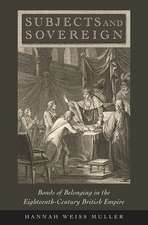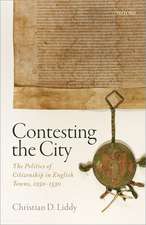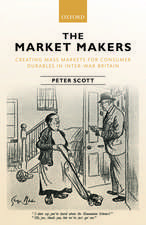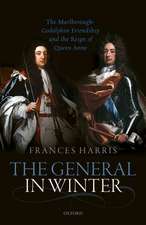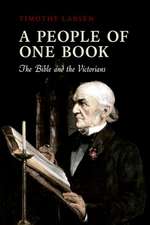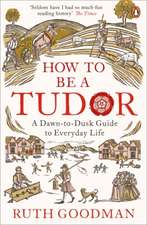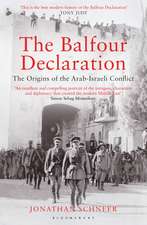Wilberforce: Family and Friends
Autor Anne Stotten Limba Engleză Hardback – 15 mar 2012
Preț: 436.45 lei
Preț vechi: 598.38 lei
-27% Nou
Puncte Express: 655
Preț estimativ în valută:
83.51€ • 87.19$ • 69.12£
83.51€ • 87.19$ • 69.12£
Carte tipărită la comandă
Livrare economică 24-31 martie
Preluare comenzi: 021 569.72.76
Specificații
ISBN-13: 9780199699391
ISBN-10: 0199699399
Pagini: 356
Ilustrații: 12 black and white images
Dimensiuni: 162 x 240 x 25 mm
Greutate: 0.77 kg
Editura: OUP OXFORD
Colecția OUP Oxford
Locul publicării:Oxford, United Kingdom
ISBN-10: 0199699399
Pagini: 356
Ilustrații: 12 black and white images
Dimensiuni: 162 x 240 x 25 mm
Greutate: 0.77 kg
Editura: OUP OXFORD
Colecția OUP Oxford
Locul publicării:Oxford, United Kingdom
Recenzii
This is an absorbing and worthwhile study, humane and empathetic in welcome contrast to the moral and emotional sterility of many a political biography.
... beautifully and sensitively captures their [the Claphamites] particular legacy of high-minded evangelical fervour and crusading zeal tempered by strong family attachments, deep friendships, intellectual curiosity and spontaneous enjoyment of innocent pleasures ...
[Anne Stott] tells her compelling story with great sympathy, and has a gift for insightful comparisons.
This biography serves as an important reminder that the vicissitudes and pleasures of family life were enmeshed with public men and women's political and religious attitudes. Well-researched and enjoyably written, the book offers a wealth of insights into late eighteenth- and early nineteenth-century domestic life in England. The perspective of the Clapham women is both refreshing and clarifying. Religious, gender, and family historians of this time period will find Stott's account to be valuable and illuminating.
This is well written, deliberately accessible for the non-expert reader, but also a leisurely book where the pleasure comes from immersion in these family relationships. The expert historian might not learn anything new about gender or the family in the period, but this does not detract from a scholarly and engaging work that does tell us something new about Wilberforce and particularly the women and men who made him who he was. In particular, it reminds us of how significant friends and family are to shaping the identity of great men.
although Anne Stott tells a tale whose contours are mostly familiar, her meticulous reconstruction of the private lives of Wilberforce and the 'Saints' opens up unexpected and compelling new perspectives on it ... in letting the protagonists speak for themselves she allows them to undermine the subtle and not-so-subtle reverence of many existing accounts ... The strength of this book is that it tries to tell things as they really were. [It is] such a good read.
Anne's thoroughly well researched references and notes make this account of Claphams most significant resident and the network of domestic relationship which earthed his pursuit of great causes, a thoroughly good read, casting light on the crucial significance of Wilberforces closest friends and acquaintances.
It is this meticulously researched and engagingly written movement between broad themes and intimate detail that makes Stotts book an important contribution to the history of the Clapham Sect, telling the very human story of these much-studied humanitarians.
With infinite care she has uncovered the family dynamics of a household which struggled with inadequate means and an uncomfortable balance of virtue over income. The result casts a most intriguing light on the practical problems of being a reforming and moralising politician in the eighteenth and early nineteenth centuries. There are too many memorable incidents and insights to recount.
Anne Stott's latest book is an excellent example of the ways in which the religious, as well as the broader intellectual and political, currents of an age can be illuminated through the exploration of family connections. ... this is a well-researched, broadly based and sympathetic analysis of an under-explored dimension of an influential religious grouping.
... beautifully and sensitively captures their [the Claphamites] particular legacy of high-minded evangelical fervour and crusading zeal tempered by strong family attachments, deep friendships, intellectual curiosity and spontaneous enjoyment of innocent pleasures ...
[Anne Stott] tells her compelling story with great sympathy, and has a gift for insightful comparisons.
This biography serves as an important reminder that the vicissitudes and pleasures of family life were enmeshed with public men and women's political and religious attitudes. Well-researched and enjoyably written, the book offers a wealth of insights into late eighteenth- and early nineteenth-century domestic life in England. The perspective of the Clapham women is both refreshing and clarifying. Religious, gender, and family historians of this time period will find Stott's account to be valuable and illuminating.
This is well written, deliberately accessible for the non-expert reader, but also a leisurely book where the pleasure comes from immersion in these family relationships. The expert historian might not learn anything new about gender or the family in the period, but this does not detract from a scholarly and engaging work that does tell us something new about Wilberforce and particularly the women and men who made him who he was. In particular, it reminds us of how significant friends and family are to shaping the identity of great men.
although Anne Stott tells a tale whose contours are mostly familiar, her meticulous reconstruction of the private lives of Wilberforce and the 'Saints' opens up unexpected and compelling new perspectives on it ... in letting the protagonists speak for themselves she allows them to undermine the subtle and not-so-subtle reverence of many existing accounts ... The strength of this book is that it tries to tell things as they really were. [It is] such a good read.
Anne's thoroughly well researched references and notes make this account of Claphams most significant resident and the network of domestic relationship which earthed his pursuit of great causes, a thoroughly good read, casting light on the crucial significance of Wilberforces closest friends and acquaintances.
It is this meticulously researched and engagingly written movement between broad themes and intimate detail that makes Stotts book an important contribution to the history of the Clapham Sect, telling the very human story of these much-studied humanitarians.
With infinite care she has uncovered the family dynamics of a household which struggled with inadequate means and an uncomfortable balance of virtue over income. The result casts a most intriguing light on the practical problems of being a reforming and moralising politician in the eighteenth and early nineteenth centuries. There are too many memorable incidents and insights to recount.
Anne Stott's latest book is an excellent example of the ways in which the religious, as well as the broader intellectual and political, currents of an age can be illuminated through the exploration of family connections. ... this is a well-researched, broadly based and sympathetic analysis of an under-explored dimension of an influential religious grouping.
Notă biografică
Anne Stott has taught at the Open University and Birkbeck, University of London, as well as various other adult education institutions. She has published extensively on women and Evangelicalism, and her book, Hannah More: The First Victorian (OUP, 2003) won the Rose Mary Crawshay Prize in 2004. She is a participant in the Dissenting Academies Project run by the Dr Williams Centre. She is the administrator of the Long Eighteenth-Century Seminar, University of London.

